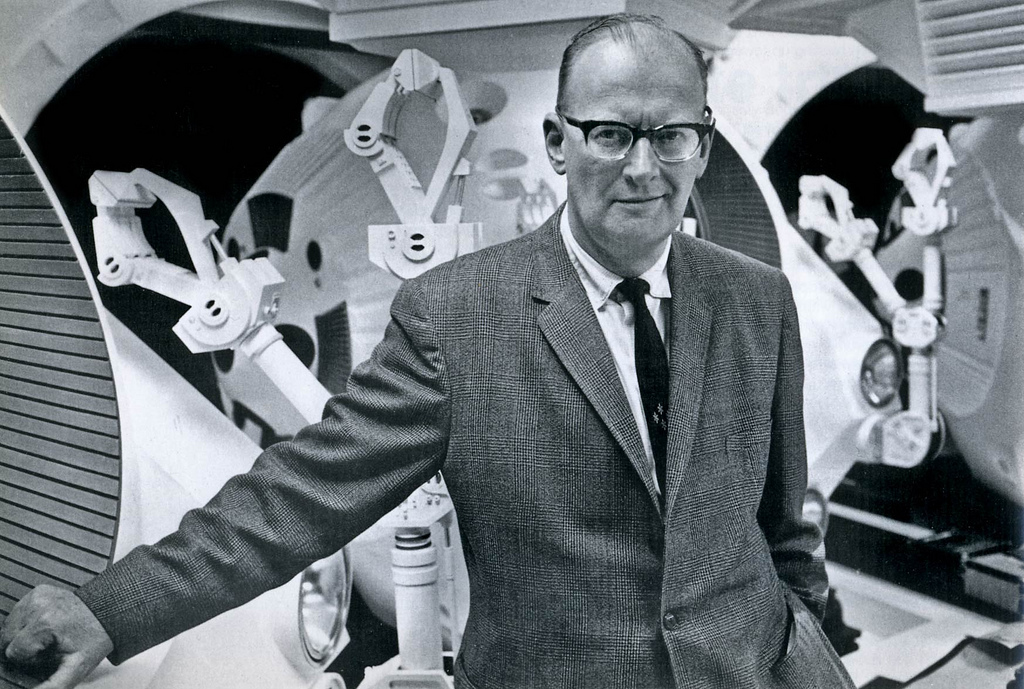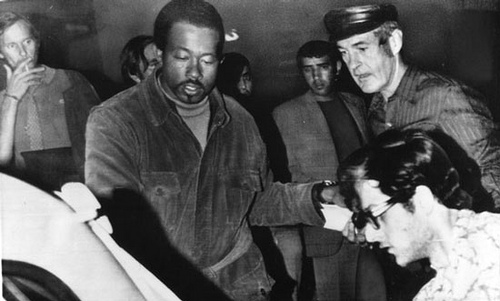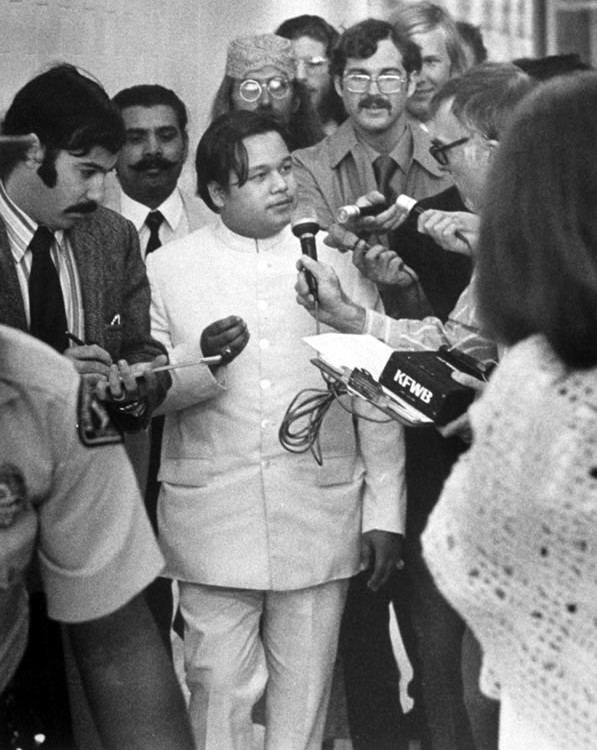__________________________
In this 1960 clip, Arthur C. Clarke acknowledges the “only thing that is sure about the future is that it will be absolutely fantastic,” before promising by the year 2000 we would genetically engineer servant monkeys, abolish cities and utilize instant-communication devices.
He was right, of course, in believing the transistor would allow us to immediately reach one another at all times as well as telecommute, though he felt these changes might mean the end of city living, which, of course, was far off the mark. He was too bold in his predictions about bioengineering, though he’ll likely be right should Homo sapiens survive potential climate-change disaster. (I don’t, however, think that “servant monkeys” will be the direction we go.) Clarke further thought we would tinker with the human brain so that we could learn Chinese overnight and erase bad memories. Unsurprisingly, the co-creator of HAL-9000 envisioned conscious machines zooming past our intelligence, biological evolution reaching its endgame and organic life having served its purpose as a stepping stone to greater knowledge.
__________________________
In this clip, philosopher, LSD guru and countercultural icon Dr. Timothy Leary and his wife Rosemary deplane in Algeria and, after a few words with reporters, walk into the waiting of arms of fugitive Black Panther Eldridge Cleaver.
The backstory: During his 1970 gubernatorial race against Ronald Reagan in California, Leary was railroaded into a 20-year prison sentence for the dubious charge of possession of two joints. He escaped from the penitentiary, spent time in Algeria with Cleaver before the two had a falling out and was finally recaptured at an airport in Afghanistan. Leary was returned to the states to continue his sentence at Folsom Prison.
California Governor Jerry Brown released Leary in 1976 and the controversial figure spent the last two decades of his life encouraging the construction of space colonies and being an early Internet enthusiast.
__________________________
Below is a trailer for Lord of the Universe, a 1974 documentary about adolescent guru Maharaj Ji, who came to some fame in those days for promising to levitate the Houston Astrodome, a plot that never got off the ground. More than any other holy-ish person of the time, the Indian teenager would have fit in quite nicely in Silicon Valley of 2015. He was a technocrat who believed he could disrupt and improve the world. Sound familiar?
The former child preacher Marjoe Gortner was hired by OUI, a middling vagina periodical of the Magazine Age, to write a deservedly mocking article about the American visit of the self-appointed messiah. Two excerpts from the resulting report.
The guru’s people do the same thing the Pentecostal Church does. They say you can believe in guru Maharaj Ji and that’s fantastic and good, but if you receive light and get it all within, if you become a real devotee-that is the ultimate. In the Pentecostal Church you can be saved from your sins and have Jesus Christ as your Saviour, but the ultimate is the baptism of the Holy Ghost. This is where you get four or five people around and they begin to talk and more or less chant in tongues until sooner or later the person wanting the baptismal experience so much-well, it’s like joining a country club: once you’re in, you’ll be like everyone – else in the club.
The people who’ve been chanting say, “Speak it out, speak it out,” and everything becomes so frenzied that the baptismalee will finally speak a few words in tongues himself, and the people around him say, “Oh, you’ve got it.” And the joy that comes over everybody’s faces! It’s incredible. It’s beautiful. They feel they have got the Holy Spirit like all their friends, and once they’ve got it, it’s forever. It’s quite an experience.
So essentially they’re the same thing pressing on your eyes while your ears are corked, and standing around the altar speaking in tongues. They’re both illuminating experiences. The guru’s path is interesting, though. Once you’ve seen the light and decided you want to join his movement, you give over everything you have–all material possessions. Sometimes you even give your job. Now, depending on what your job is, you may be told to leave it or to stay. If you stay, generally you turn your pay checks over to the Divine Light Mission, and they see that you are housed and clothed and fed. They have their U. S. headquarters in Denver. You don’t have to worry about anything. That’s their hook. They take care of it all. They have houses all over the country for which they supposedly paid cash on the line. First class. Some of them are quite plush. At least Maharaj Ji’s quarters are. Some of the followers live in those houses, too, but in the dormitory-type atmosphere with straw mats for beds. It’s a large operation. It seems to be a lot like the organization Father Divine had back in the Thirties. He did it with the black people at the Peace Mission in Philadelphia. He took care of his people-mostly domestics and other low-wage earners–and put them up in his own hotel with three meals a day.
The guru is much more technologically oriented, though. He spreads a lot of word and keeps tabs on who needs what through a very sophisticated Telex system that reaches out to all the communes or ashrams around the country. He can keep count of who needs how many T-shirts, pairs of socks–stuff like that. And his own people run this system; it’s free labor for the corporation.
· · · · · · · · · ·
The morning of the third day I was feeling blessed and refreshed, and I was looking forward to the guru’s plans for the Divine City, which was soon going to be built somewhere in the U. S. I wanted to hear what that was all about.
It was unbelievable. The city was to consist of ‘modular units adaptable to any desired shape.’ The structures would have waste-recycling devices so that water could be drunk over and over. They even planned to have toothbrushes with handles you could squeeze to have the proper amount of paste pop up (the crowd was agog at this). There would be a computer in each communal house so that with just a touch of the hand you could check to see if a book you wanted was available, and if it was, it would be hand-messengered to you. A complete modern city of robots. I was thinking: whatever happened to mountains and waterfalls and streams and fresh air? This was going to be a technological, computerized nightmare! It repulsed me. Computer cards to buy essentials at a central storeroom! And no cheating, of course. If you flashed your card for an item you already had, the computer would reject it. The perfect turn-off. The spokesman for this city announced that the blueprints had already been drawn up and actual construction would be the next step. Controlled rain, light, and space. Bubble power! It was all beginning to be very frightening.•



